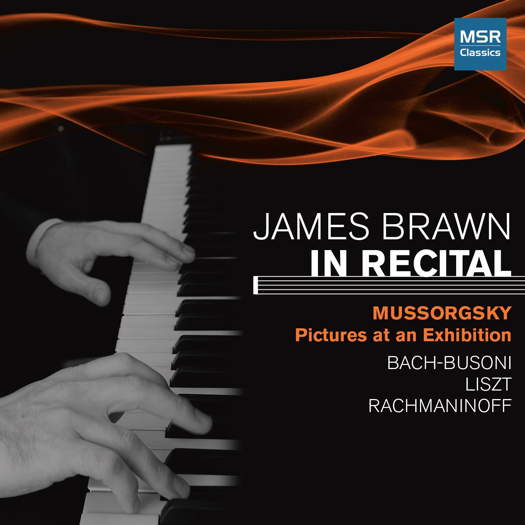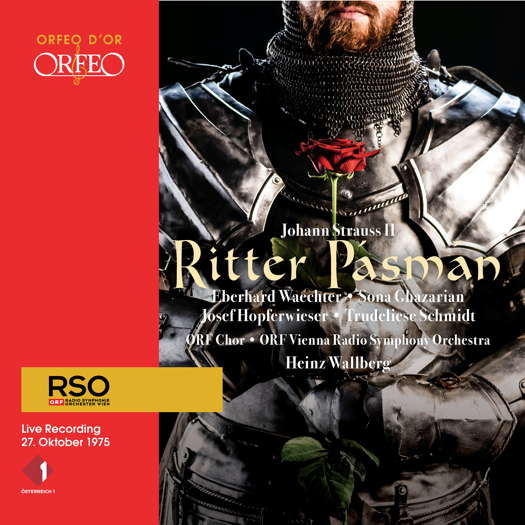- Mimis Plessas
- Andrea Chénier
- Raymond Leppard
- Flavio Testi
- Hans Hotter
- Adolf Hitler
- City of London Sinfonia
- Robin Baggett
 SPONSORED: CD Spotlight. True Command - James Brawn plays Bach, Liszt, Musorgsky and Rachmaninov - recommended by Andrew Schartmann.
SPONSORED: CD Spotlight. True Command - James Brawn plays Bach, Liszt, Musorgsky and Rachmaninov - recommended by Andrew Schartmann.
All sponsored features >>
 DISCUSSION: What is a work? John Dante Prevedini leads a discussion about The performing artist as co-creator, including contributions from Halida Dinova, Yekaterina Lebedeva, Béla Hartmann, David Arditti and Stephen Francis Vasta.
DISCUSSION: What is a work? John Dante Prevedini leads a discussion about The performing artist as co-creator, including contributions from Halida Dinova, Yekaterina Lebedeva, Béla Hartmann, David Arditti and Stephen Francis Vasta.

A Kiss from the Queen
Johann Strauss II's only opera, 'Ritter Pásmán', heard by GERALD FENECH
'... vibrantly performed by the Slovak State Philharmonic Orchestra and finely conducted by Alfred Walter.'
Among the hundreds of compositions that Johann Strauss II wrote, one finds a substantial number of operettas but only one opera, Ritter Pásmán. Up to the beginning of the 1890s the composer had never attempted to write a full-scale stage-work, but he was always eager to attain this goal. The long-awaited opportunity arrived when the Court Opera Director Wilhelm Jahn commissioned the composer to write a 'genuine opera', an offer Strauss readily accepted with heart and soul. The result was Ritter Pásmán (Knight Pásmán). The libretto by Ludwig Doczi is based on a Hungarian narrative poem by János Arany, portraying an episode from the life of the Hungarian King Charles I who ruled in the fourteenth century and hailed from the Angevin dynasty.
The story takes place in Hungary during the Renaissance period and unfolds in Pásmán and the King's castles respectively. The Knight's wife and servants are hurrying to prepare a meal to welcome Pásmán and his band on their way back from the hunt. One of the hunters falls in love with the Knight's wife and kisses her on the forehead when the husband is not looking. Later, after the hunter leaves, Pásmán finds out about the kiss and, having cursed his wife, goes to the King to demand justice. The Knight is followed by his wife and maid. He insists on kissing the hunter's wife as revenge. The King then reveals that he was the one who kissed Pásmán's wife. The opera ends with the Knight being allowed to take a kiss from the Queen.
When the opera's premiere was made public, it was met with great enthusiasm as, by then, much was expected of the 'Waltz King', and also because this was his first (and only) full-scale opera. However, the first performance at the Vienna Court Opera on New Year's Day 1892 was a frigid affair, and most critics predicted a bleak future for the work. Indeed, there was nothing amiss with the music, but the banality of the text and lack of evident characterization were the main reasons why this 'Knight' never really got going. One must also consider Jahn's mediocre conducting on that first evening which also contributed to the premiere's failure. After nine performances the Vienna Opera withdrew the piece, but luckily some music has survived, notably the ballet and the Czardas from Act 3.
Listen — Johann Strauss II: Czardas (Ritter Pásmán)
(CD2 track 17, 2:24-3:16) ℗ 2021 Orfeo International Music GmbH :
This 1975 revival recorded live at a concert version from the Musikverein in Vienna is timely indeed. Heinz Wallberg conducts his forces with commendable control, and the response is an assured and beautifully sung performance full of wit and charm, although one has to admit that Strauss's inspiration was at times, well, average.
Listen — Johann Strauss II: Ein Ring, ein Ring (Ritter Pásmán)
(CD1 track 14, 0:00-0:48) ℗ 2021 Orfeo International Music GmbH :
An extra bonus is the stirring complete ballet music, vibrantly performed by the Slovak State Philharmonic Orchestra and finely conducted by Alfred Walter.
Listen — Johann Strauss II: Polka (Ritter Pásmán)
(CD2 track 15, 4:05-5:01) ℗ 2021 Orfeo International Music GmbH :
Not a top recommendation, but those who love their Strauss will definitely enjoy this rare piece.
Copyright © 29 May 2021
Gerald Fenech,
Gzira, Malta

CD INFORMATION - JOHANN STRAUSS II: RITTER PÁSMÁN
ORFEO INTERNATIONAL MUSIC GMBH
MORE CLASSICAL MUSIC ARTICLES ABOUT AUSTRIA


